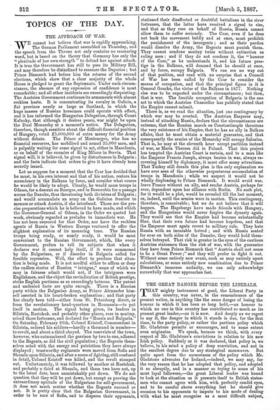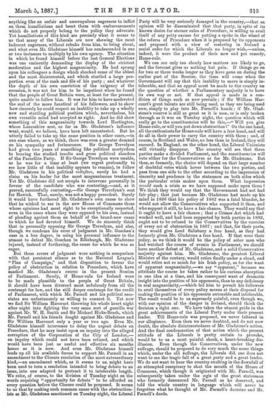THE GREAT DANGER BEFORE THE LIBERALS.
THAT mighty instrument of good, the Liberal Party in this country, was never, in the remembrance of the present writer, in anything like the same danger of losing the honour in which it has been so long held,—an honour to which no one in this country has contributed so much as its present great leader,—as it is now. And deeply as we regret to say it, the danger in which it stands is due, for the first time, to the party policy, or rather the partisan policy which Mr. Gladstone permits or encourages, and to some extent even originates. We speak, because we think, with every respect of Mr. Gladstone's convictions in relation to his new Irish policy. Suddenly as it was declared, that policy is, we believe, in his mind a policy of deep conviction, and not in the smallest degree due to any strategical manoeuvre. But quite apart from the earnestness of the policy which Mr. Gladstone advocates for Ireland,—indeed, we may say, for the very reason that he has adopted that policy, and adopted it so abruptly, and in a manner so trying to some of his most loyal followers,—the great Liberal leader was bound to look at the situation as it presents itself to British states- men who cannot agree with him, with perfectly candid eyes, and to be careful above everything lest he should give occasion to his opponents to impute to his mode of dealing with what he must recognise as a most difficult subject,
anything like an unfair and unscrupulous eagerness to inflict on them humiliations and beset them with embarrassments which do not properly belong to the policy they advocate. Yet humiliations of this kind are precisely what it seems to us that many of the Liberals are now showing the most indecent eagerness, without rebuke from him, to bring about, and what even Mr. Gladstone himself has condescended in one or two instances to multiply by his own agency. The situation in which he found himself before the last General Elections was one eminently demanding the display of the strictest moderation and the highest magnanimity. He had sprung upon his colleagues a design which shocked some of the ablest and the most disinterested, and which startled a large pro- portion even of the rank and file of his party ; and whatever the depth of his own conviction of the exigency of the occasion, it was not for him to be impatient when he found that the people of Great Britain were, at least for the present, quite unable to follow him. It was for him to have moderated the zeal of the more fanatical of his followers, and to show how sincerely he could respect an inability to take up a wholly new and startling political position which, nevertheless, his own versatile mind had accepted as right. And he did show something of this magnanimity towards Lord Hartington, whose Lancashire seat, so far as Mr. Gladstone's influence went, would, we believe, have been left uncontested. But he utterly failed to take up the same position in other cases,—in one case where, as we think, there was even a greater demand on his sympathy and forbearance. Sir George Trevelyan had given two years of something like political martyrdom to braving the studied insults and gross political slanders of the Parnellite Party. If Sir George Trevelyan were unable, as he was for a time at least (we regret profoundly to see how little of that inability appears to remain), to follow Mr. Gladstone in his political volteface, surely he had a claim on his leader for the most magnanimous treatment. Yet Mr. Gladstone did not scruple to intervene personally in favour of the candidate who was contesting,—and, as it proved, successfully contesting,—Sir George Trevelyan's seat for Hawick. That, surely, was not a happy precedent. Surely it would have furthered Mr. Gladstone's own cause to show that he wished to see in the new House of Commons those whose opinions had most right to be exceptionally respected, even in the cases where they were opposed to his own, instead of pleading against them on behalf of the brand-new cause to which he had devoted himself. We do sincerely think that in personally opposing Sir George Trevelyan, and also, though we condemn his error of judgment in Mr. Goschen's case in a less degree, in using his personal influence to the utmost to defeat Mr. Goschen in Edinburgh, Mr. Gladstone injured, instead of furthering, the cause for which he was so eager.
But these errors of judgment were nothing in comparison with that persistent silence as to the National League's "Plan of Campaign," and that disposition to favour the policy of obstruction in relation to Procedure, which have marked Mr. Gladstone's course in the present Session of Parliament. Surely, if Home-rule for Ireland were to be made plausible to the people of Great Britain, it should have been divorced moat sedulously from all the contempt for law, and the still deeper contempt for the credit of Parliament, with which Mr. Parnell and his political asso- ciates are unfortunately so willing to connect it. Yet now we find Sir William Harcourt throwing his whole heart night after night into fighting the very same sort of guerilla war against Mr. W. H. Smith and Sir Michael Hicks-Beach, which Mr. Parnell and his friends fought against Mr. Gladstone and Sir William Harcourt only a year or two ago. Even Mr. Gladstone himself intervenes to delay the urgent debate on Procedure, that he may insist upon an inquiry into the alleged corruption of the Corporation of the City of London,— an inquiry which could not have been refused, and which would have been just as useful and effective six months hence as it is now. And even Mr. Gladstone himself leads up all his available forces to support Mr. Parnell in an amendment to the Closure resolution of the most extraordinary kind,—an amendment which, as it seems to us, might have been used to turn a resolution intended to bring debate to an issue, into one adapted to protract it to intolerable length. We refer, of course, to the division of Tuesday night on the words requiring " opportunity for debate " to be afforded on every question before the Closure could be proposed. It seems to us that by making such common cause with the obstruction- ists as Mr. Gladstone sanctioned on Tuesday night, the Liberal Party will be very seriously damaged in the country,—that an opinion will be disseminated that that party, in spite of its known desire for sterner rules of Procedure, is willing to avail itself of any petty excuse for putting a spoke in the wheel of the reform of Procedure when it is proposed by its opponents and proposed with a view of restoring in Ireland a social order for which the Liberals no longer wish,—unless, indeed, it were the product of their new and pet remedy, Home-rule.
We can see only too clearly how matters are likely to go, and the forecast gives us nothing but pain. If things go on for two or three weeks longer as they have gone on during the earlier part of the Session, the time will come when the Government will say that this inability to move is simply in- tolerable, and that an appeal must be made to the country on the question of whether a Parliamentary majority is to have its own way or not. If that appeal is made in a con- dition of things such as now prevails ; if Sir William Hex- court's great talents are still being used, as they are being used now, simply to play into Mr. Parnell's hands ; if Mr. Glad- stone's reserve is still as great as it is now, or is only broken through as it was on Tuesday night, the question which will really go to the constituencies will be this,—" Will you give Home-rule, or will you put down obstruction ?" On the one hand, all the enthusiasts for Home-rule will have a free hand, and will do all in their power to carry the country with them ; and, of course, in Scotland and Wales, no less than in Ireland, they will succeed. In England, on the other hand, the Liberal Unionists will virtually disappear. The country will see that three parties make a divided Parliament, and the constituencies will vote either for the Conservatives or for Mr. Gladstone. But then, as formerly, the choice will depend on that large number of doubtful votes which hover between the two parties, and pass from one side to the other according to the impression of sincerity and prudence in the statesmen on both sides which the particular crisis makes upon them. What impression would such a crisis as we have supposed make upon them V We think they would say that the Government had not had fair play ; that just because Mr. Gladstone had made up his mind in 1886 that his policy of 1882 was a fatal blunder, he would not allow the Conservatives who supported it then, and who support it still, to have a fair chance. They would say that it ought to have a fair chance ; that a Crimes Act which had worked well, and had been supported by both parties in 1882, ought not to be refused to the Conservatives by the exercise of every act of obstruction in 1887 ; and that, for their parts, they would give Lord Salisbury a free hand, as they had formerly given Mr. Gladstone a free hand. If that were their policy, as we think it would be the policy of sober men who had watched the course of events in Parliament, we should have another defeat of Mr. Gladstone, and a solid Conservative majority against him. Mr. Gladstone, the greatest Liberal Minister of the century, would retire finally under a cloud, and would retire not so much for his Irish policy, as for the want of apparent magnanimity,—we say " apparent," because we attribute the coarse he takes rather to his curious absorption in one idea at a time, and his consequent want of dramatic insight into the position of his opponents, than to any deficiency in real magnanimity,—which led him to permit his followers to avail themselves of every paltry means at their disposal for making the position of his opponents untenable and intolerable. The result would be to us supremely painful, even though we, with our opinion of the danger in Ireland, should think the decision a right one. We have taken the utmost pride in the great achievements of the Liberal Party under their present leader. Till Home-rule was proposed, we never faltered in our allegiance. Even then we never doubted, and do not now doubt, the absolute disinterestedness of Mr. Gladstone's action. And the final condemnation of that action which the present attitude of the Liberals is pretty certain to provoke, would be to us a most painful shock, a heart-breaking dis- illusion. Even though the Conservatives, under the new suffrage, should be prepared to do very much the same things which, under the old suffrage, the Liberals did, one does not want to see the tragic fall of a great party and a great leader. We do not want to hear the country exulting in the downfall of an attempted conspiracy to shut the mouth of the House of Commons, which though it originated with Mr. Parnell, was subsequently taken under the aegis of the great statesman who formerly denounced Mr. Parnell as he deserved, and told the whole country in language which will never be forgotten what he thought of Mr. Parnell's doctrine and Mr. Parnell's deeds.



































 Previous page
Previous page